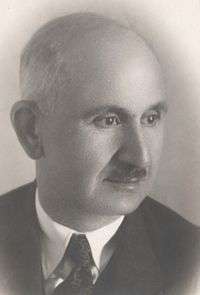Abd al-Rahman al-Kayyali
Abd al-Rahman al-Kayyali (Arabic: عبد الرحمن الكيالي) (1887 – 13 September 1969) was a physician from the city of Aleppo and member of the Syrian independence movement who became the Minister of Justice for two terms.
Abd al-Rahman al-Kayyali عبد الرحمن الكيالي | |
|---|---|
 | |
| Minister of Justice | |
| In office 21 December 1936 – 18 February 1939 | |
| Preceded by | Said al-Ghazzi |
| Succeeded by | Nasib al-Bakri |
| In office 19 August 1943 – 5 April 1945 | |
| Preceded by | Faydi al-Atasi |
| Succeeded by | Said al-Ghazzi |
| Personal details | |
| Born | 1887 Aleppo, Ottoman Syria |
| Died | September 13, 1969 (aged 81–82) Aleppo, Syria |
Biography
Born in Aleppo, al-Kayyali studied medicine at the Lebanese American University and graduated in 1914.[1] Upon the emergence of WWI, he served as a medic in the Ottoman Army in Al-Hamraa, Hama Governorate.
In 1919, al-Kayyali was among the founders of the Arab Club of Aleppo, a political salon and society that promoted Aleppine regionalism and Arab nationalism in Syria against the French rule during the Mandate for Syria and the Lebanon.[2]
Later on, he joined the National Bloc, in which he became a member of Parliament in 1928, 1936 and 1943. In the meantime, he served as the Minister of Justice during the premiership of Jamil Mardam Bey, Saadallah al-Jabiri and Faris al-Khoury, [3] from 1936 to 1939 and from 1943 to 1945.
Al-Kayyali also served as a diplomat for Syria. After the formal independence of Syria following the Franco-Syrian Treaty of Independence in September 1936, he was appointed non-resident ambassador to the League of Nations by president Hashim al-Atassi, a position he quit after his nomination as a cabinet member in December 1936. From 1947 to 1949 he represented the Syrian Republic as a delegate to the United Nations General Assembly.[4]
Al-Kayyali died on 13 September 1969.
Legacy
As a representative of the Aleppan bourgeoisie and a nationalist activist, al-Kayyali built strong ties with leaders of Syria's first indepence movement, including Ibrahim Hananu, leader of the so-called Hananu Revolt against French rule. Kayyali can be considered one of the most prestigious citizens of Aleppo of his time and a Western educated proponent of anti-colonial nationalist ideology. [5]
One of al-Kayyali's grandsons, the dentist Mustafa Kayali (or Al-Kayyali), emerged as a prominent civil society activist during the Syrian uprising and was, according to media reports, among the authors of a document known as the "Code of Conduct for Syrian Coexistence" in 2017, endorsed by various Syrian community leaders.[6]
References
- مثقفون سياسيون سوريون ليبراليون بمنتصف القرن العشرين. alaraby.co.uk (in Arabic). 15 January 2018.
- Khoury, Philip Shukry (1987). Syria and the French Mandate: The Politics of Arab Nationalism, 1920-1945. Princeton, New Jersey: Princeton University Press. p. 106.
- White, Benjamin Thomas (2012-09-11). Emergence of Minorities in the Middle East. Edinburgh University Press. ISBN 9780748688937.
- Moubayed, Sami (2018). The Makers Of Modern Syria. I.B. Tauris. doi:10.5040/9781350988880. ISBN 978-1-78673-455-6.
- Gelvin, James L. (1951). Divided Loyalties: Nationalism and Mass Politics in Syria at the Close of Empire. Los Angeles / Berkeley: University of California Press. pp. 85–86.
- Team, ICSR (2018-01-18). "Syria's Best of Enemies Breaking Good". ICSR. Retrieved 2019-10-23.